Americans remain highly critical of the job performance of both Democratic and Republican leaders in Congress. Many offer harsh assessments when asked for one word impressions of the current Congress. Among the most frequently offered are variations on dysfunctional, corrupt, self-serving and inept.
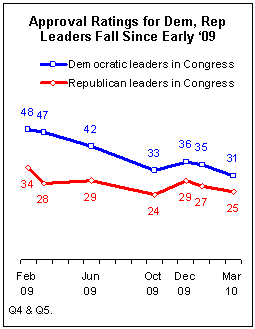 Job approval ratings for the leaders of both parties (31% for Democratic leaders, 25% for Republican leaders) hover near all-time lows in 15 years of Pew Research Center surveys. Currently, 57% disapprove of how Democratic leaders are doing their job – the highest disapproval levels of the current term – while 59% disapprove of the job Republican leaders are doing – little changed from recent months.
Job approval ratings for the leaders of both parties (31% for Democratic leaders, 25% for Republican leaders) hover near all-time lows in 15 years of Pew Research Center surveys. Currently, 57% disapprove of how Democratic leaders are doing their job – the highest disapproval levels of the current term – while 59% disapprove of the job Republican leaders are doing – little changed from recent months.
Gridlock in Congress is undoubtedly a factor in these ratings, and here there is plenty of blame to go around. About eight-in-ten (81%) say Democrats and Republicans are not working together in Congress to deal with the important issues facing the country. And while slightly more blame the Republican leaders (25%) than the Democratic leaders (18%) for gridlock, a substantial share volunteers that both parties are equally to blame (27%).
The number of Democrats who say they disapprove of the job being 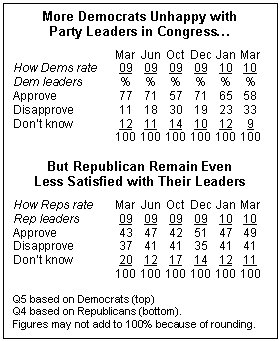 done by their party’s leaders in Congress increased from 19% in December to 23% in January to 33% today. The percentage approving of their performance fell from 71% to 58% over the same period. This marks a return to the low ratings Democrats gave their party’s leadership last October.
done by their party’s leaders in Congress increased from 19% in December to 23% in January to 33% today. The percentage approving of their performance fell from 71% to 58% over the same period. This marks a return to the low ratings Democrats gave their party’s leadership last October.
Even with growing Democratic frustration, it is the Republicans who continue to express broader disapproval of their leadership. Just 49% of Republicans approve of the job Republican leaders are doing, while 41% disapprove. Republican views have remained largely unchanged over the course of the past year.
In the early part of 2009, Democratic leaders in Congress enjoyed more support from independents than did their Republican counterparts. But by the latter part of 2009 – and through today – independents have been offering equally negative assessments of both parties. Among independents, disapproval of Democratic leaders has nearly doubled over the 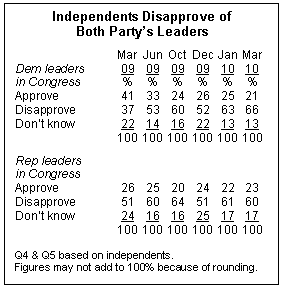 past year from 37% last March to 66% currently. Disapproval is largely unchanged since January (63%). Only 21% of independents now approve of the job being done by Democratic leaders. That is little changed from January (25%), but about half of where approval stood in March 2009 (41%).
past year from 37% last March to 66% currently. Disapproval is largely unchanged since January (63%). Only 21% of independents now approve of the job being done by Democratic leaders. That is little changed from January (25%), but about half of where approval stood in March 2009 (41%).
Independent opinion of GOP leaders shows less movement. Currently, 23% approve of the job being done by Republican leaders, about the same as the 26% that said this in March 2009 or 22% this January. Disapproval among independents is up slightly from 51% last March to 60% now.
Negative Words for Congress
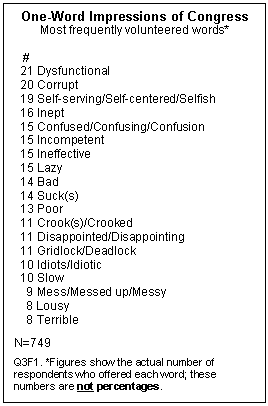 When Americans are asked to provide the one word that best describes their current impressions of Congress, the three most frequently offered terms are dysfunctional (21 people offered this), corrupt (20) and some version of self-serving, self-absorbed or selfish (19). Many of the words reflect perceptions that Congress has been unable or unwilling to enact legislation. For example, 16 people described Congress as inept, while 15 each offered variations on confusing, incompetent, ineffective or lazy. Slightly smaller numbers (11 each) refer to disappointment or gridlock.
When Americans are asked to provide the one word that best describes their current impressions of Congress, the three most frequently offered terms are dysfunctional (21 people offered this), corrupt (20) and some version of self-serving, self-absorbed or selfish (19). Many of the words reflect perceptions that Congress has been unable or unwilling to enact legislation. For example, 16 people described Congress as inept, while 15 each offered variations on confusing, incompetent, ineffective or lazy. Slightly smaller numbers (11 each) refer to disappointment or gridlock.
Note that all of these figures represent the actual number of people offering each word, not percentages. With such a wide range of terms volunteered, no single word is offered by more than 3% of the 749 people asked the question.
While the complaints vary, the critical tone of peoples’ responses is nearly universal. Of people offering a description, fully 86% volunteered a word that was negative, while just 4% offered positive words such as good (7 people) or OK (4).
Few See Efforts at Bipartisanship
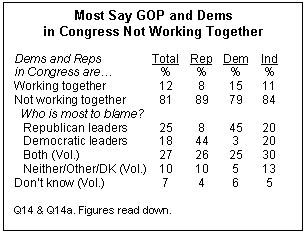 Eight-in-ten Americans (81%) say Democrats and Republicans in Congress are not working together. And the feeling crosses party lines – 89% of Republicans, 84% of independents and 79% of Democrats see partisan gridlock. The public puts slightly more of the responsibility for this on Republican leaders: 25% say GOP leaders are most to blame, while 18% say Democratic leaders are most to blame. Still, 27% volunteer that leaders of both parties are to blame for failing to work together.
Eight-in-ten Americans (81%) say Democrats and Republicans in Congress are not working together. And the feeling crosses party lines – 89% of Republicans, 84% of independents and 79% of Democrats see partisan gridlock. The public puts slightly more of the responsibility for this on Republican leaders: 25% say GOP leaders are most to blame, while 18% say Democratic leaders are most to blame. Still, 27% volunteer that leaders of both parties are to blame for failing to work together.
Not surprisingly, Democrats tend to put more blame on Republican leaders (45% say GOP leaders are most to blame, 25% volunteer both and 3% say their own party’s leaders are to blame), while Republicans blame Democrats (44% say Democratic leaders are most to blame, 26% say both and 8% say Republican leaders).
Independents say leaders of both parties share responsibility for the lack of bipartisanship. Two-in-ten say leaders of each party are most to blame (20% say Republicans, 20% say Democrats). Three-in-ten (30%) independents volunteer that both parties’ leaders are to blame.
Who’s More Ethical?
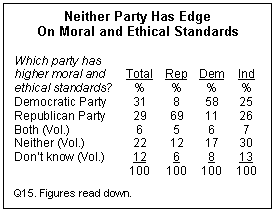 Americans are divided over which political party demonstrates higher personal standards. About three-in-ten (31%) choose the Democrats, when asked which party has the higher moral and ethical standards, while a comparable number (29%) choose the Republicans. Notably, more than two-in-ten (22%) volunteer “neither.”
Americans are divided over which political party demonstrates higher personal standards. About three-in-ten (31%) choose the Democrats, when asked which party has the higher moral and ethical standards, while a comparable number (29%) choose the Republicans. Notably, more than two-in-ten (22%) volunteer “neither.”
Not surprisingly, Democrats and Republicans are most likely to say their own party has higher standards (69% of Republicans choose the GOP, while 58% of Democrats choose their own party). Independents, again, are divided: 26% say the Republican Party has higher moral and ethical standards, while 25% say the Democratic Party does. Among independents, 30% volunteer “neither.”


